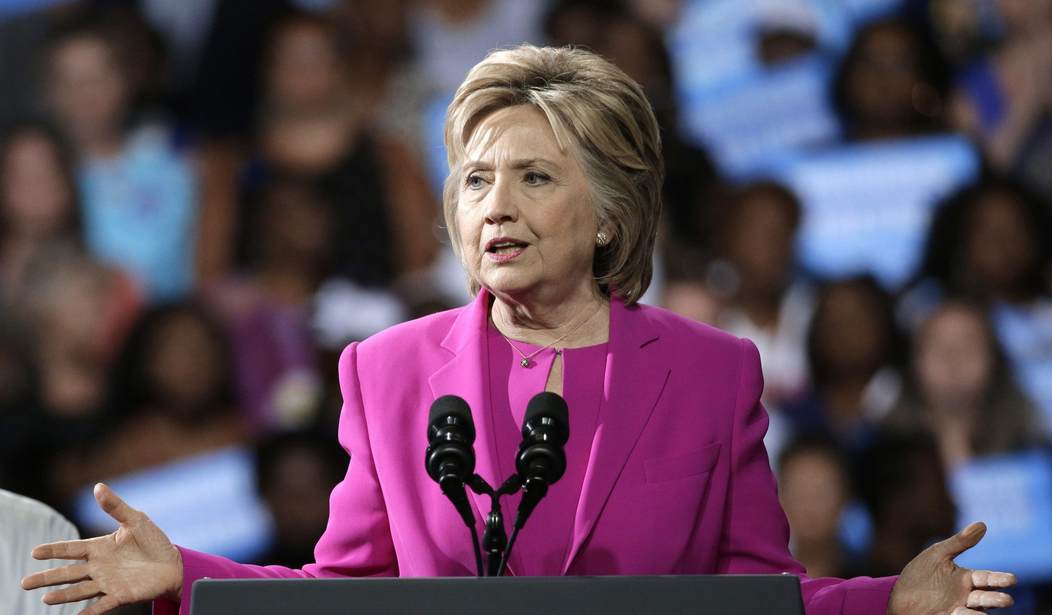On Wednesday, Judicial Watch issued a subpoena to Google, demanding emails from former Secretary of State Hillary Clinton that were supposedly sent to a Gmail account before being deleted. The subpoena is part of a long-term Judicial Watch Freedom of Information Act (FOIA) lawsuit seeking “talking points or updates on the Benghazi attack” which also involves a court-ordered deposition of Clinton herself. This FOIA request uncovered Clinton’s insecure private home-brew server in 2015.
“A federal court, tired of the State and Justice Departments’ gamesmanship, authorized Judicial Watch’s subpoena to Google to follow a lead on the Clinton emails,” Tom Fitton, president of Judicial Watch, said in a statement. “DOJ and State are AWOL and covering up for Hillary Clinton, so it is again up to Judicial Watch to do the basic investigative heavy lifting to get at the truth.”
The Google subpoena, announced Wednesday, demands the Big Tech company produce all Clinton emails from a Google account believed to contain Clinton’s emails. Platte River Networks’ IT specialist Paul Combetta reportedly used a Google account to transfer Clinton’s emails from a laptop to a Platte River server, then used BleachBit to remove any traces of the emails from the laptop. The subpoena seeks all Clinton emails from her time at State, between January 21, 2009 and February 1, 2013. Google must turn over the emails by May 13.
U.S. District Court Judge Royce Lamberth raised concerns about Clinton’s Gmail cache during an August 2019 federal court hearing. Lamberth cited a report from Sen. Chuck Grassley (R-Iowa).
“The gist of it was that Combetta had said, I guess, that he had created a dummy email account with all of the Hillary Clinton emails in it in a different name, and the FBI had investigated that to see whether or not the Chinese had ever hacked into it. They have determined that the Chinese hadn’t, but that the FBI never told the State Department about that account and that the emails that were not given over to State could have been obtained from that account, but the FBI never told State about it,” the judge said.
Senate committees released documents “revealing that Clinton IT aide Paul Combetta copied all but four of the missing emails to a Gmail account that does not appear to have ever been reconstructed and searched,” Lamberth added. “The court thinks Judicial Watch ought to shake this tree.”
On March 2, 2020, Lamberth granted Judicial Watch’s request to subpoena Google.
“The Court is not confident that State currently possesses every Clinton email recovered by the FBI; even years after the FBI investigation, the slow trickle of new emails has yet to be explained. For this reason, the Court believes the subpoena would be worthwhile and may even uncover additional previously undisclosed emails. Accordingly, the Court GRANTS this request,” the judge wrote.
In December 2018, Lamberth first ordered discovery into whether Clinton’s use of a private email server was intended to stymie FOIA, whether the State Department’s intent to settle this case in late 2014 and early 2015 amounted to bad faith, and whether the State Department has adequately searched for records responsive to Judicial Watch’s request.
The court ruled that Clinton’s email system was “one of the gravest modern offenses to government transparency.”
Hillary Clinton and her former Chief of Staff Cheryl Mills have refused to testify under oath in the case, claiming a Writ of Mandamus request. In an unusual move, the State Department opposed Clinton’s attempt to dodge testimony, agreeing with Judicial Watch that her previous position as secretary of State cannot protect her from this order.
It is an outrage that it has taken this long for Clinton’s emails to be released, and it seems clear that the former secretary of State was attempting to circumvent FOIA using her private home-brew server. Judicial Watch is doing the hard work to prove that case.
Tyler O’Neil is the author of Making Hate Pay: The Corruption of the Southern Poverty Law Center. Follow him on Twitter at @Tyler2ONeil.









Join the conversation as a VIP Member